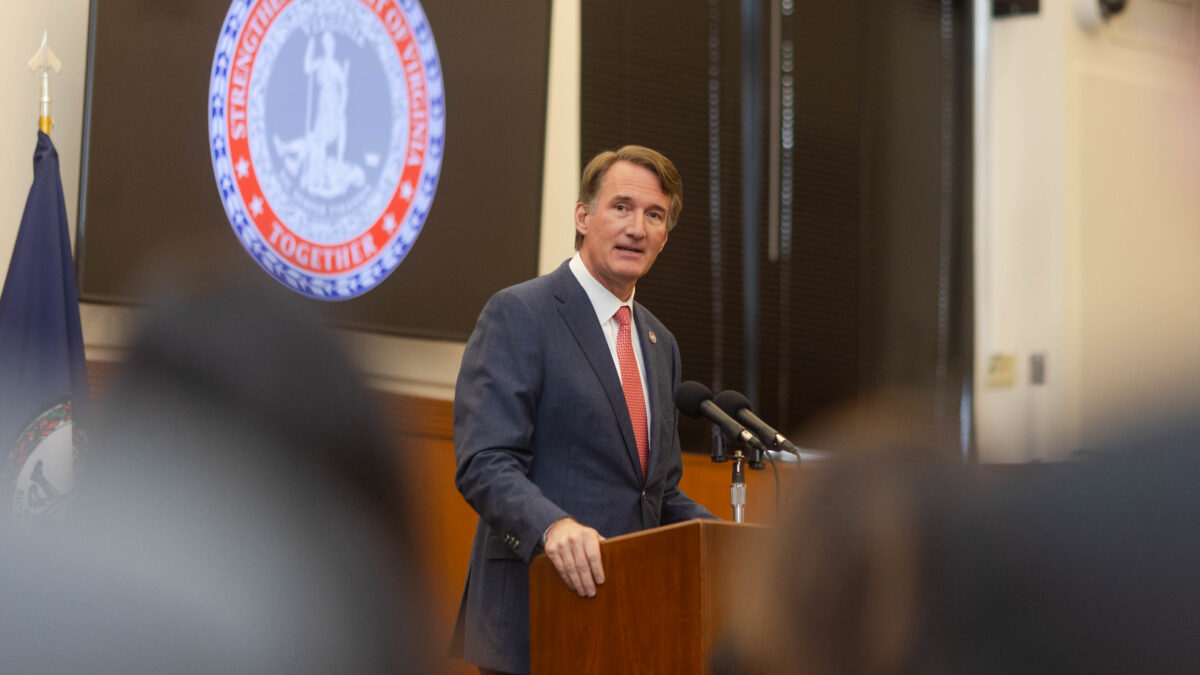Several of the election process changes pushed mostly by Democrats across the nation threaten to disenfranchise legal voters. The confusing process of ranked-choice voting creates the possibility that a voter’s ballot will be trashed, and the removal of safeguards against noncitizen voting increases the likelihood that an eligible voter’s ballot could be canceled out by an illegal vote. Both issues are now under the spotlight in Virginia, as bills relating to each await Gov. Glenn Youngkin’s veto.
The bills were part of a handful of bills sent to Youngkin’s desk from the Democrat-controlled legislature that would make Virginia elections less secure. Thankfully, one has already met Youngkin’s veto pen.
Disenfranchisement via Ranked-Choice Voting
In recent years, Democrats, center-left activists, and establishment Republicans have increased their push across the nation for a ballot-counting scheme called ranked-choice voting (RCV). It is a purposeful push, since RCV systemically favors left-leaning candidates and harms conservatives — even in cases when a majority of voters actually vote for conservatives.
With ranked-choice voting, as The Federalist’s Shawn Fleetwood explained, “voters rank candidates in order of preference. If no candidate receives a majority of votes in the first round, the last-place finisher is eliminated, and his voters are reallocated to the voter’s second-choice candidate. The process continues until one candidate receives a majority of votes.” RCV has been pushed since the ’90s by leftist groups such as FairVote, which also seeks to abolish the Electoral College and replace it with a straight popular vote scheme.
Virginia SB428 would potentially disenfranchise voters by further normalizing and expanding RCV in Virginia elections. It does so by requiring the State Board of Elections to create “standards for vote tabulating software for use with existing voting systems in elections conducted by ranked choice voting,” requiring the State Board of Elections to create voter education materials on RCV, publish these on their website, and assist localities deciding to use RCV in developing voter education materials on that topic. The bill also invites RCV software companies to begin applying to the Virginia State Board of Elections for accreditation. This enormous investment of resources in RCV would pave the way for it to become the way of voting in Virginia.
The bill also provides that if a ballot is damaged and cannot go through the machine, it will not be hand counted, but a substitute ballot will be created to match the original as best as possible.
RCV not only enables candidates to win elections even if they did not receive the most votes in the first tally of ballots, but it also creates the opportunity for ballot exhaustion, which happens when a voter only ranks one candidate on his ballot and that candidate is eliminated in the tally.
Additionally, this bill limits any potential risk-limiting audits requested by local election boards to the “first rankings reported by voting systems.” In other words, such audits would not be conducted of the follow-up rounds of tabulation in any election not decided in the first round of voting.
Potential Disenfranchisement via Noncitizen Voting
Virginia HB1454, SB246, and HB26 all risk disenfranchising citizens by making it more difficult to stop noncitizen voting. Thanks to the Biden administration’s open border free-for-all, millions of illegal aliens have been added to the tens of millions of noncitizens already present in the United States. Regardless of legal status, it is a crime for any noncitizen to vote in a U.S. federal election. Even a single noncitizen vote disenfranchises all Americans by diluting their votes.
HB1454 and its companion bill SB246 would remove restrictions currently placed on the backs of the state-issued drivers’ privilege cards that Virginia allows “individuals who are non-U.S. citizens and cannot meet Virginia’s legal presence requirements” — i.e., illegal aliens — to obtain.
Virginia law currently mandates that “the front of a driver privilege card or permit shall be identical in appearance to a driver’s license or permit that is not a REAL ID credential and the back of the card or permit shall be identical in appearance to the restriction on the back of a limited-duration license, permit, or special identification card.” But these bills would remove the statutory requirement about the back of the cards, simply stating that the fronts of such driver privilege cards must match “a driver’s license or permit that is not a REAL ID credential.” The bills also direct the Department of Motor Vehicles (DMV) to extend the validity of these limited-duration cards (currently two years or less) to up to eight years.
HB26 invites voter fraud, including from noncitizen voting, by adding difficult-to-verify IDs from nongovernmental sources as valid identification to be able to vote. Unless Youngkin vetoes the bill, it will allow voters to provide “any valid identification card containing a photograph of the voter and issued by any private entity that is licensed or certified, in whole or in part, by” a state health or social service agency.
The people of Virginia, like all U.S. citizens, have a right to fair and honest elections. Fair and honest elections cannot exist when any noncitizen or other ineligible voter casts a ballot that is then counted, or when the method of tabulating the ballots overrides the will of the voters.
This article has been updated since publication.








